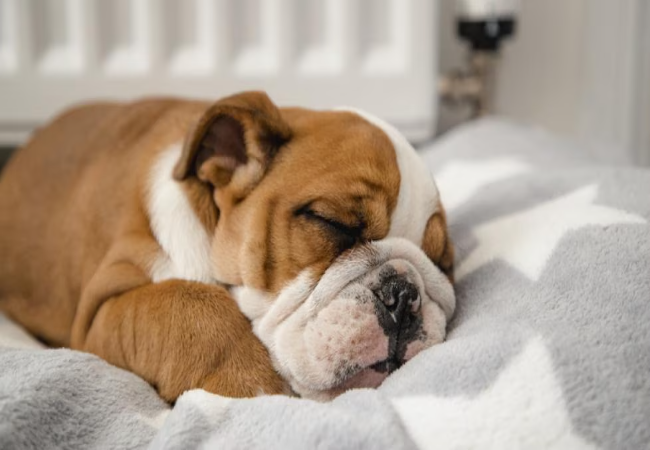Healthy Puppy Sleep Schedule 2025: Expert Vet Guide 🐶💤

In this article
Healthy Puppy Sleep Schedule 2025: Expert Vet Guide 🐶💤
By Dr. Duncan Houston BVSc
Welcoming a new puppy into your life is full of joy, curiosity—and sometimes a little chaos! One of the biggest challenges new pet parents face is understanding and managing their puppy’s sleep. Sleep is vital for healthy development, learning, and emotional balance. In this comprehensive guide, we’ll explore how to create a balanced, vet-approved sleep schedule tailored to your puppy’s age, breed, and behavior. 🐾
🐕🦺 How Much Sleep Do Puppies Need?
Puppies are growing machines—and all that growth takes energy. Depending on age and breed, most puppies sleep between 12 to 20 hours a day. Here's a breakdown by age:
- 8–12 weeks: 18–20 hours per day, including naps
- 3–6 months: 16–18 hours, gradually reducing as they mature
- 6–12 months: Around 14–16 hours as they approach adulthood
Breed also matters: Giant and large breeds like Great Danes or Mastiffs often sleep more to support musculoskeletal growth, while smaller breeds like Yorkies or Toy Poodles may nap more frequently in short bursts.
🛏️ Creating the Perfect Puppy Sleep Setup
A dedicated sleep area helps your puppy feel secure and teaches good boundaries. Most vets, myself included, recommend crate training for this purpose. A well-sized crate mimics a den—offering security and helping with house training.
🏠 Crate Training Tips:
- Start with short sessions and gradually increase duration
- Make it cozy—add soft bedding and a safe cuddle toy
- Place it in your bedroom initially so your puppy doesn’t feel isolated
⏰ The Ideal Nighttime Routine
Consistency is key! Puppies thrive on routine, especially around bedtime. Follow this schedule for a smoother night:
- 7:00 PM: Final meal of the day
- 8:00 PM: Calm play session or short walk
- 8:30 PM: Last potty break
- 9:00 PM: Crate time with a chew toy or comfort item
Most puppies need at least one overnight potty break until they’re around 16 weeks old. Take them out calmly—no play or stimulation—and return them to bed right after. ⛅
🧠 Understanding Daytime Naps
Puppies nap often—sometimes every hour. Here's how to support healthy nap habits:
- Create a quiet, comfortable spot for napping
- Avoid overstimulation before rest periods
- Use soft background noise like classical music or a white noise machine
- Don’t disturb napping—sleep is when their brains process learning!
🐩 Breed-Specific Sleep Insights
🧸 Small Breeds (e.g., Chihuahua, Toy Poodle)
- Need frequent naps—every 2–3 hours
- Often feel cold—use a covered crate or warm bedding
🏃 Medium Breeds (e.g., Beagle, Border Collie)
- Need a balance of exercise and rest
- Overtired pups may show hyperactivity instead of sleepiness
🦮 Large & Giant Breeds (e.g., Golden Retriever, Great Dane)
- Sleep longer stretches—growth hormone is released during deep sleep
- Provide orthopedic bedding early to support joints
😴 Sample Puppy Sleep Schedule (12 Weeks)
- 7:00 AM: Wake up, potty
- 7:30 AM: Breakfast
- 8:30–10:00 AM: Nap
- 12:00 PM: Lunch
- 1:00–2:30 PM: Nap
- 4:00 PM: Play & training
- 5:30 PM: Dinner
- 6:30–8:00 PM: Calm activity
- 8:30 PM: Last potty & bed
- Midnight: Optional potty break if needed
❗ Common Sleep Challenges & Solutions
| Problem | Cause | Fix |
|---|---|---|
| Frequent night waking | Potty needs, anxiety | Limit water before bed, |
| Crying in crate | Lack of crate training | Short training sessions, reward quiet time |
| Hyperactivity at bedtime | Under-exercised | Engage in evening play or training |
| Sleeping too much | Normal if active when awake | Only worry if energy drops or appetite changes—then see a vet |
📞 When to Talk to a Vet
- Sudden changes in sleep habits
- Lethargy despite rest
- Signs of pain or limping after sleep
- No improvement in sleep pattern by 4–5 months of age
Use Ask A Vet for real-time support. Our licensed vets help decode unusual sleep behaviors and provide health screening right from your phone.
🧸 Tools to Support Better Puppy Sleep
- Ask A Vet App: 24/7 help with crate training, potty confusion & behavioral support
📌 Final Thoughts
A structured sleep schedule supports your puppy’s brain development, potty training success, and emotional regulation. Remember, sleep struggles are temporary—but their benefits last a lifetime. Stick with it, stay consistent, and don’t hesitate to ask for help when needed.






